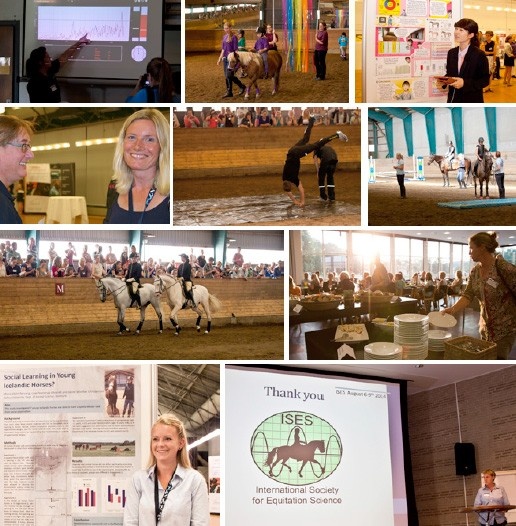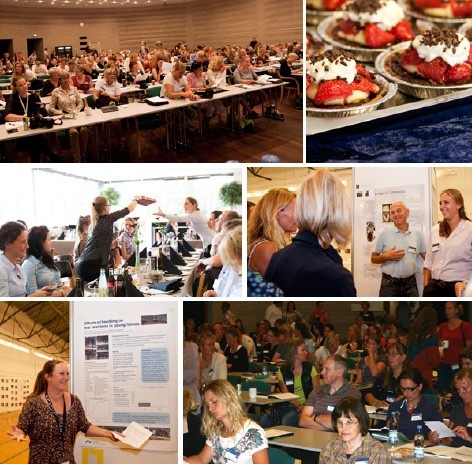10th International Conference
Vejle, Denmark 2014
Conference theme: Equine Stress, Learning and Training
Scientific themes:
- Interpretation of equine stress responses
- Learning and cognition
- Sustainable training and riding.
The conference was attended by 235 delegates from 22 countries. The conference attracted international scientists and practitioners discussing aspects of stress responses, learning and cognition, and sustainable training of horses. Her Royal Highness Princess Benedikte of Denmark, who is greatly supportive of initiatives to improve horse welfare and human safety, was the patroness of ISES 2014.
The three-day conference with 35 spoken presentations and 57 poster presentations took the participants back to the biological roots of Equitation Science focussing on the measurement and interpretation of stress responses in horses, continuing with the theme of learning and cognition and concluding with how the results of scientific research can be used to achieve sustainable riding and training. Highlights included five plenaries by renowned scientists and a number of review presentations.
2014 conference student awards
Each year ISES awards two prizes to students during the ISES conference. One award is for the Best Poster and one for the Best Oral Presentation. These awards are worth free registration at the conference in the following year.
With an average score of 13.3 (out of 15), the Poster award for 2014 went to Sara Hintze (University of Bern) et al. for their poster: Should I stay or should I go. A very interesting study in which she showed that horses can be trained more easily on a ‘go/no go’ paradigm than on an active avoidance paradigm. The poster received high scores for originality and new insights into Equitation Science.
With an average score of 20.3 (out of 25) the Oral award for 2014 went to Jessie Weir (University of Florida) for her talk: A preliminary investigation of horses’ preference for different ammonia concentrations. Her talk was characterised as ‘clever study design’ and ‘confident speaker’.


The Interpretation of equine stress responses theme introduced the fundamentals of stress. The main message being that in order to assess stress in horses, studies must be carefully planned and conducted under standardised and controlled conditions using validated methods and take indicators such as behavioural observations into account. Equestrians are reminded that besides the physical impact of stressors, perception (e.g. inherent fearfulness, life history and early experience) are also key contributory factors to the stress experienced by horses (and humans).
Not only does stress affect the welfare of horses, it also has direct implications for training and the learning capacity in horses, which was addressed within the presentations on learning and cognition.
The links between stress and brain function, including effects of the neurotransmitter dopamine, were emphasised. Dopamine is heavily involved in the reward system and in memory formation and learning in horses. There is no doubt that research in neuroscience and brain function will bring new insights to the importance of how horses learn optimally in practice. Presentations addressing sustainable training and riding highlighted the importance of adequately preparing the horse for exercise and competition, and the often forgotten physical and physiological condition of the riders. The need for more objectivity in dressage judging was emphasised and a vision for training in horse sport based on learning theory was presented.
A range of scientific topics were presented in a number of very interesting free papers; examples being rugging, road safety.
The practical session held at Billund Riding Centre focussed on the theme Ontogeny of the rider. The audience was provided with a delightful demonstration by Mette Hald and Merete Stenner (Ædelund Shetland ponies) and their 10 Shetland ponies and young students. Hald and Stenner demonstrated learning theory being put into practice by children and their trainers within the riding school setting, with obvious benefits for the welfare and learning of both children and ponies and promotion of a lot of fun during the process of teaching children how to train and ride horses.
Using simple training skills coupled with techniques drawn from martial arts, Judo champion Palle Flodgaard and Helle Sydendal expertly demonstrated how to fall from a horse without getting hurt. Professional rider and horse trainer, Susan Kjærgård (BlueBerryHill), delivered an educational showjumping clinic teaching four horse–rider pairs that had previously experienced problems during jumping, to apply learning theory to circumvent the horses’ behavioural problems resulting in improved jumping outcomes. The practical day concluded with an impressive demonstration of the principles of academic riding by Belgian Riding Academy Equestrian Instructor, Leopold Gombeer and Justin Verboven. Academic riding was discussed as one alternative way of performing dressage training. The practical day successfully provided a platform for discussion of training methods, and for promoting the mission of integration between science and practitioners.
The ISES 2014 conference was hosted by Aarhus University at the modern and comfortable Vingsted Hotel and Conference Centre near Vejle in Denmark where guests enjoyed splendid meals, indoor and outdoor sports facilities and a range of relaxing recreational activities.
Photos: Kasia Olczak
Conference Proceedings
Click Open to enlarge, download, print, search and share the proceedings
Sign up to the ISES newsletter
Get notifications on the latest research, evidence-based horse management, conference details and more

